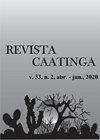不同施钾量和水分条件下甘蔗品种初期生长的生化差异
IF 0.9
4区 农林科学
Q3 AGRONOMY
引用次数: 2
摘要
甘蔗品种具有不同的生化和生产能力,在水分和养分胁迫条件下,生化和生产能力得到强化。水分胁迫促进了植物的生化变化,如活性氧(ROS)的过量产生,根据浓度的不同,活性氧会降解光合色素。目前的研究表明,K+在提高产量和抗水分胁迫方面起着重要作用。研究了两种水分条件下不同K+水平对两个甘蔗品种初始生长的影响。试验在温室中进行,随机分组,4次重复,5次K+剂量(0;0.5;1;2和6 mmol L-1),两个甘蔗品种(RB92579和RB992506),两种水分条件(水化植株和水分胁迫)。数据分析采用5×2×2因子方案。测定叶片碳水化合物、光合色素、抗氧化酶活性(过氧化氢酶、超氧化物歧化酶和抗坏血酸过氧化物酶)和干物质产量。K+处理促进了植株干质量的增加。与RB92579相比,RB992506的APX活性较低,光合色素、碳水化合物和干物质含量较高。水分条件和因子间的相互作用对研究变量没有影响。与RB92579相比,RB992506具有优越的生化和生产性状,具有较强的抗水分胁迫能力。本文章由计算机程序翻译,如有差异,请以英文原文为准。
Biochemical differences in the initial growth of sugarcane varieties cultivated under different potassium doses and water conditions
ABSTRACT Sugarcane varieties have distinct biochemical and productive capacities, which are accentuated under water and nutrient stress conditions. Water stress promotes biochemical changes in plants, such as the overproduction of reactive oxygen species (ROS) that, depending on the concentration, degrade photosynthetic pigments. Current research indicates that K+ plays an important role in increasing yield and tolerance to water stress. This study evaluated the effect of different K+ levels on the initial growth of two sugarcane varieties under two water conditions. The experiment was conducted in a greenhouse using randomized blocks, with four replications, five K+ doses (0; 0.5; 1; 2 and 6 mmol L-1), two sugarcane varieties (RB92579 and RB992506), and two water conditions (hydrated plants and water stress). Data were analyzed in a 5×2×2 factorial scheme. Leaf carbohydrates, photosynthetic pigments, antioxidant enzyme activity (catalase, superoxide dismutase and ascorbate peroxidase) and dry matter production were assessed. K+ doses promoted an increase in plant dry mass. The RB992506 variety had lower APX activity and higher levels of photosynthetic pigments, carbohydrates and dry matter than its RB92579 counterpart. Water conditions and interactions between factors had no effect on the variables studied. RB992506 is a promising variety and more tolerant to water stress due to its superior biochemical and productive traits when compared to RB92579.
求助全文
通过发布文献求助,成功后即可免费获取论文全文。
去求助
来源期刊

Revista Caatinga
AGRONOMY-
CiteScore
2.10
自引率
11.10%
发文量
67
审稿时长
6-12 weeks
期刊介绍:
A Revista Caatinga é uma publicação científica que apresenta periodicidade trimestral, publicada pela Pró-Reitoria de Pesquisa e Pós-Graduação da Universidade Federal Rural do Semi-Árido – UFERSA, desde 1976.
Objetiva proporcionar à comunidade científica, publicações de alto nível nas áreas de Ciências Agrárias e Recursos Naturais, disponibilizando, integral e gratuitamente, resultados relevantes das pesquisas publicadas.
 求助内容:
求助内容: 应助结果提醒方式:
应助结果提醒方式:


